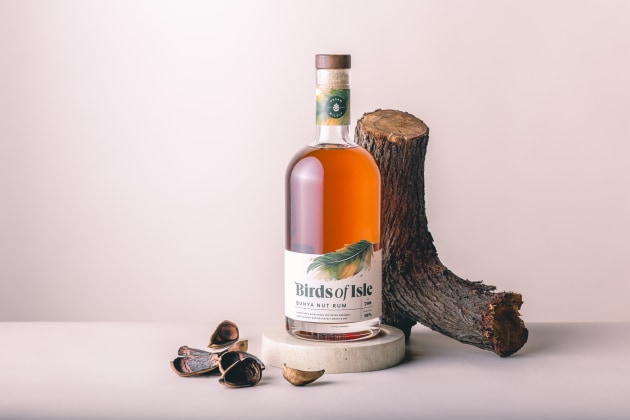“Classic corporate career change” is how Birds of Isle co-founders Chanel Melani and Sally Carter describe their path to creating possibly Australia’s first female-owned and -operated rum brand. Kim Berry speaks to the pair about making a new Aussie rum.
Birds of Isle co-founder, Sally Carter, has always been a rum drinker, having grown up in the rum heartland that can be country New South Wales. With her partner and co-founder, Chanel Melani, the pair wanted to apply their skills to something they were passionate about.
“Sally’s background is in procurement and operations, and mine is in marketing, so that was a good foundation. We wanted to do something that was outside the box, would be a game changer, and break down barriers. And we thought – rum,” Melani says.
The two saw the spirit as an untapped opportunity and potential. With Australia producing more than 30 million tonnes of sugarcane every year, the iconic Bundaberg Rum taking up most of the landscape, and consumers’ knowledge of the spirit being limited, Melani and Carter set themselves a mission – to challenge outdated perceptions of rum, change the narrative surrounding it, make it appealing to a broader audience, and most importantly, find a way to incorporate Australian terroir into Bird of Isle.
“Rum could be our national spirit. The northeastern coastline of Australia is full of sugarcane, so we’ve decided to embrace it in a complex and thoughtful way that we think could change people’s minds about rum,” Melani says.

Carter says they want to create a rum that is gender neutral, that steers away from the dark spirits for men, clear spirits for women trope.
Based in the Northern Rivers region – Bundjalung Country – of New South Wales in Murwillumbah, Bird of Isle’s first two releases were independent bottling varieties, meaning Melani and Carter blended existing rums to make their own. Their goal is to produce rum in the Spanish style, a lighter and drier variety than the heavier, bolder style of British rum, which most Australian rums follow.
They settled on a blend of five Venezuelan rums that had been aged for two, three, four, five and eight years in American oak ex-bourbon barrels.
“We chose those rums for their light and dry Spanish-style flavour profile that we couldn’t find locally. Unlike other rums in that style, we didn’t add any sugar. We then finished the rum in Australia for seven months in these amazing French oak ex-muscat barrels we got from the master cooper, Andrew Young, at Seppeltsfield in the Barossa Valley, South Australia. It’s a rare finishing cask for rum,” Melani says.
Meanwhile, their flagship rum is still ageing, with a planned release in late 2025/early 2026. It has been made with local molasses from sugar cane grown in Bundjalung.
“For rum to be sold in Australia it must be aged for a minimum of two years. We’re almost there. The flavour is already incredible and getting better every month, so we want to do it justice and give it more time,” Carter says.
Cracking the nut
Using ingredients from Bundjalung to capture the local terroir in the rum is table stakes for Carter and Melani. They worked with an Indigenous chef and cultural advisor to learn about native ingredients and how to ensure a respectful use and representation of them. She also introduced them to the bunya nut.
Carter says, “We did around 70 trials with different ingredients in the area, and the bunya nut was the most interesting. The game changer was when our advisor told us we could smoke the shells. It meant we could bring smoke flavours into the rum in a very Australian way, which was super exciting.”
Bunya Pines are endemic to Australia and have grown here since the Jurassic period (145-200 million years ago). Birds of Isle bunya nuts are hand-foraged locally from these prehistoric trees.
“There’s no commercial harvesting of bunya nuts and they only have a bumper crop every three to four years, but there’s something beautiful in that scarcity.
“We will only use local nuts, so the volume of each batch will be dependent on the crop,” Carter says.
The nuts are also difficult to shell, so we really did make our job exceedingly difficult for ourselves,” Melani says.
Carter adds, “It is a very manual process. The first batch I did by myself, the second batch I approached the local groups we work with and asked if they were keen to help. It still took 40 hours.”
Once shelled, the nuts are roasted and the shells are fire charred. The pair explains that the nuts impart a sense of terroir to the rum, adding subtle notes of chestnut and pinewood, while the fire-charred shells conjure peated whiskies and smoky mezcals, with a uniquely Australian flavour.
This all takes place at the Birds of Isle distillery in South Murwillumbah.
Carter says, “Everything happens here! We do our own bottling, labelling, and logistics; maturation happens onsite, all the bunya nut processing is here. The terroir piece is very important for us.”
The distillery is also committed to sustainable practices. Australia crushes roughly 30 million tonnes of sugarcane annually, making it the nation’s second-largest export crop.
Rapidly renewable, sugarcane is more effective at capturing carbon than other common plants and is also a renewable energy source. It is used to create bio-based plastics and sustainable paper alternatives.
The distillery also uses sugarcane waste pulp for its labels, upcycled packing materials in its cases, and sources custom kerbside recyclable boxes for fulfilling online orders.
With an Australian rum like no other and founders as passionate about the process as the end product, this bird of isle will surely fly far.
This article first appeared in the August/September 2024 edition of Food & Drink Business magazine.






